The unfortunate suicide of an Indian Police Service (IPS) officer in Haryana has prompted the invocation of the stringent Scheduled Castes and Scheduled Tribes (Prevention of Atrocities) Act. This development has raised significant discussions and concerns regarding the treatment of officers within the police force, especially those belonging to marginalized communities. The IPS officer, whose untimely death shocked many, reportedly faced immense pressure and harassment, which are believed to be linked to the systemic issues within the law enforcement agencies. This incident has underscored the urgent need to address mental health and workplace culture within the police force, particularly for officers from SC/ST backgrounds who may face additional challenges.
The SC/ST Act, designed to protect individuals from discrimination and atrocities based on their caste, has been brought into focus as investigators look into the circumstances surrounding the officer’s death. By invoking this act, authorities are signaling their commitment to addressing the grievances of marginalized groups within the police force and ensuring that any form of harassment is taken seriously. This case serves as a reminder of the broader societal issues that exist around caste dynamics in India and how they can permeate even into institutions meant to uphold law and order. It also highlights the need for systemic reforms to create a more inclusive and supportive environment for all officers.
Furthermore, the incident has sparked a wider debate on the mental health challenges faced by police personnel, particularly in high-stress environments like Haryana, where officers may encounter a multitude of challenges in their day-to-day duties. The stigma surrounding mental health issues in India has often led officers to suffer in silence, fearing repercussions for seeking help. The invocation of the SC/ST Act in this context may encourage more open discussions about mental health within the police force and prompt the implementation of support systems designed to assist officers in coping with the pressures of their roles.
As investigations into the officer’s suicide continue, this case may serve as a catalyst for change, prompting not only an examination of the specific circumstances surrounding this tragedy but also a broader evaluation of the working conditions for police officers across the country. Ensuring that all officers, regardless of their caste or background, have access to support and resources is essential in fostering a healthier workplace and ultimately, a more effective law enforcement system. The case stands as a poignant reminder of the need for ongoing dialogue and action to address these critical issues, ensuring that all members of society, especially those in service of the law, are treated with dignity and respect.




